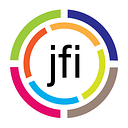Bourn Kind | JFI Online Short: March 2024
The Jewish Film Institute is pleased to present Bourn Kind as our online short for the month of March 2024.
About the Film: A Black-Jewish artist confronts division through art to spread kindness in his community.
Watch the film and read an exclusive JFI interview with director Rachel Myers to learn more about the project’s unique collaborative process.
Jewish Film Institute: How did you first connect with Bourn Rich?
I met the artist, Bourn Rich through the black Jewish entertainment alliance. I reached out to Rich after I saw him speak about the complexity of navigating his own black and Jewish identity. We connected remotely during the pandemic and hit it off immediately. I had seen his work and paintings as an artist and I asked him if he would like to collaborate on a project.
I had written a film called the Tiny Kindness Project. The film concept was a mix of social activism and street art as a response to the isolation that people were feeling during the pandemic. I had written the script initially to be played by an actor, but when I met Rich, I realized immediately that he would be the perfect collaborative creative partner, because of his kind, gentle nature as a human and his tremendous gifts and talent as an artist. I knew that his honesty and kindness would give the project depth and truth and together in collaboration, the project became reality.
We did the Tiny Kindness Project as real social activism on the streets by taking pictures of people with placed messages on their masks that Rich created. Then he used the photos as part of the painting and the mural came to life. The Mural in the film was up for a year in Los Angeles, at a site that had been central to the Black Lives Matter protests. We also did a second mural as part of the project in New York in alphabet city. The site of the New York Mural was with permission of the city of New York at the location of the first housing project in New York City.
JFI How did you collaborate together on the Tiny Kindness project? How did your Jewish identities and values shape the project?
The project was inspired first by the pandemic, then activated by what was happening in the US in that moment in time with the climate of protest and change from the Black Lives Matter movement. As a black man, Rich is not often identified as a Jew and the project was about the assumptions that we make about identity when we see people and we really don’t know who they are or what their individual story is. The film is about the judgment and bias that effects the lens in how we perceive and treat one another.
Originally, I had an idea that in the film, the artist would do the project, and then paint murals of just masked faces, but in the collaboration with Rich the idea grew and took heart. Rich had the genius idea of adding a rainbow map of America behind the faces, representing the fabric and breath of different types of people in our country during a moment of trauma and division.
JFI: Can you talk about the importance of Black Jewish identity being represented in this film?
I think, particularly now, it’s very important to express black Jewish identity. The trauma of slavery and racism in America endures and shapes so much about American perception, but adding the complexity and questions of Jewish identity to that conversation can be perplexing to understand. There isn’t one way to be Jewish or Black or American.
The film is about this question, which I think is also a question of our time for many people. Jews have been called an ethnic group, a race, a culture or a people, but the nuance of Jewish identity and Jewish history is complicated and particularly now I think it’s very hard for many Americans to understand when looking at Jews through a lens shaped by defining what is “other” in contrast to whiteness. There are no simple answers regarding the diversity of Jewish people and Jewish identity.
As a Jewish Artist and filmmaker, I’m very interested in how we express the range and variety of Jewish identity, particularly in this moment of rising antisemitism, and also in this climate with the polarization of opinion around the Jewish state. I wanted to show the breath of who Jews are and what we can be and do through Rich’s portrayal and actions in the film and in his own life, to be seen for his humanity.
JFI: What do you hope people take away from watching your film in 2024?
I think it’s very easy to look at someone and make an assumption, or to treat a person in a certain way, based on your own bias. My hope is that we try to see one another with love. To see the stranger as friend.
About the Filmmaker: Rachel Myers is an award-winning filmmaker, director, producer and designer, raised in Oregon with a diverse international background. She’s created over 150 film, television, and theatre productions in her 20+ year career, starting as an actor. Myers film Bourn Kind premiered at Tribeca and Cannes. Her award winning films Wendy’s Shabbat and 2 Black Boys premiered at TRIBECA and OUTFEST, screening at Palm Springs International Film Festival and 70 other festivals worldwide. Wendy’s Shabbat was broadcast on PBS and TOPIC and considered for Academy Awards.
About JFI Online Shorts: JFI Online Shorts features one new short film each month from emerging and established filmmakers. Since 2009, JFI has showcased over 100 online shorts and garnered worldwide views over 2 million on the JFI Youtube channel. Learn more at www.jfi.org.
